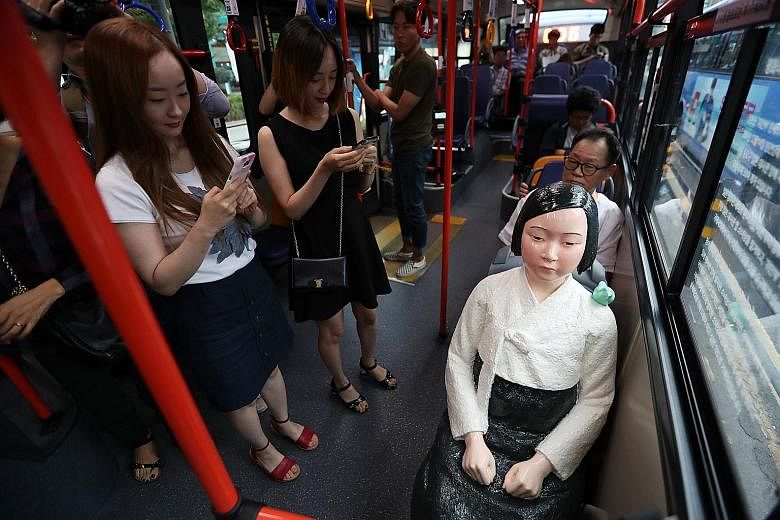South Korea marks its 72nd year of freedom from imperial Japanese rule today, with five new wartime sex slave statues installed on its buses yesterday and another two of slave workers erected last week.
The move immediately prompted Japan to express concern that "the installation of the statues might discourage the joint efforts by Japan and the ROK (Republic of Korea) to build future-oriented relations".
"As the Japanese government repeatedly confirmed with the Government of President Moon Jae In, we hope to develop Japan-ROK relations in a future-oriented manner," Foreign Ministry deputy press secretary Toshihide Ando told The Straits Times.
"We have conveyed our position to the ROK side through the diplomatic channel and asked them to take appropriate measures," he added.
A bus operator installed five comfort women statues on board its buses, and they are slated to remain until Sept 30. The term "comfort women" is a euphemism for the estimated 200,000 women who were forced into the sex trade by the Japanese military during World War II.
Seoul Mayor Park Won Soon, who rode on one of the buses yesterday, reportedly said this was an opportunity to "pay tribute" to the victims.
Meanwhile, another two statues to denote coerced labour were installed by civic groups last Saturday outside Yongsan station in Seoul and at Incheon Park.
Mr Jang Duk Hwan, secretary- general of the National Association for Justice for Forced Labourers, reportedly said the group wanted to draw more attention to the issue of forced labour, which does not receive as much focus as sex slaves.
Millions of Koreans are estimated to have been forced to work for the Japanese. Tokyo's stance is that the issue of wartime compensation has been resolved under a 1965 pact.
A ground-breaking ceremony is slated today for another forced labourer statue outside the Japanese Embassy in Seoul. It is to be set up by October, and will be placed beside an existing comfort woman statue. Another two statues of slave workers are being planned for the cities of Busan and Gwangju.
History has, time and again, weighed on bilateral ties. The latest installations came just months after Japan recalled its Ambassador to South Korea Yasumasa Nagamine earlier this year in a diplomatic spat over a comfort woman statue outside its consulate in Busan.
This has been a frequent source of diplomatic friction, despite overtures on the part of Japan through a landmark apology in 1993 and a historic accord in 2015.
Under the latter deal, Tokyo apologised and disbursed 1 billion yen (S$12.4 million) to a fund to provide support to former South Korean comfort women and their families.
But President Moon Jae In has vowed to bring the pact - struck by his predecessor Park Geun Hye and Japanese Prime Minister Shinzo Abe - back to the drawing board.
Tokyo sees this, alongside what it deems as an inadequate response by Seoul to remove the statues, as reneging on the deal in which both countries agreed to "finally and irreversibly resolve" the issue.
Adjunct research fellow Lim Tai Wei of the National University of Singapore's East Asian Institute said the historical issues need to be contextualised against closer collaboration between Tokyo and Seoul - alongside their common ally, the United States - to manage the current threat of a bellicose Pyongyang.
"North Korea has made their (relationship) stronger," he said.

